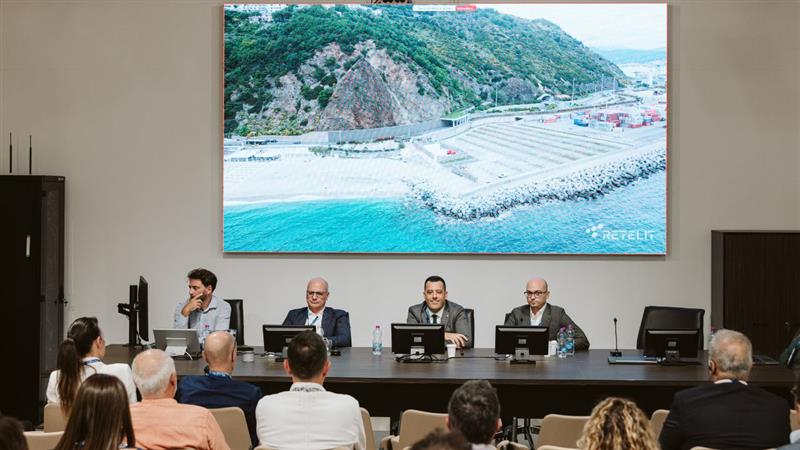Retelit presents the results of the feasibility study for the “Magna Grecia cable” project, a new digital submarine infrastructure between Italy and Greece

Retelit, a leading B2B telecommunications operator in Italy, presented yesterday in Taranto the feasibility study results of the "MAGNA GRECIA CABLE" project for the deployment of a cross-border submarine infrastructure between Italy and Greece.
The study, the outcome of in-depth technical and strategic work, identified a resilient, low-risk route in the Ionian Sea, carefully evaluating environmental conditions, sustainability, permitting, and technological solutions for cable deployment. The new infrastructure will span approximately 323.5 km and connect two strategic points in the Mediterranean region, advancing the digital transformation of territories, businesses and cities.
The "MAGNA GRECIA CABLE" project, part of Retelit’s strategic vision to strengthen Italy’s role as a Mediterranean digital hub and accelerate the development of a connected, sustainable and technologically advanced ecosystem, aims to achieve ambitious goals: enhancing the digital sovereignty of the European Union through infrastructure that both closes the infrastructure gap in less developed areas and lays the groundwork for the future European quantum network — a strategic frontier for communications security and reliability.
The selection of Taranto as Italy’s landing point — a choice strongly supported by the Ministry of Enterprise and Made in Italy, which also provided a letter of endorsement to facilitate approval — highlights the city’s strategic position at the intersection of East–West and North–South Mediterranean digital corridors. Despite its geographic importance, the Apulian city still lacks significant cable landings due to economic and investment risk challenges. However, the Gulf of Taranto, thanks to its natural features and restricted-access zones, offers a safe and protected setting for new infrastructure. Should the project proceed, which is now being defined and to be evaluated further, Taranto would gain increasing attractiveness for future investments: on one hand for companies, benefiting from physical proximity to the data landing point — leading to low latency and high service performance — and on the other hand for the telecom and connectivity sector, also because of its proximity to Bari, where Retelit’s AAE-1 cable landing station is located. This further strengthens the Apulian territory’s centrality in the Mediterranean digital landscape.
On the Greek side, the Plataria site near Igoumenitsa already hosts an existing landing point, simplifying the approval process and offering direct connections to national fibre networks, with potential extensions to Thessaloniki, Athens and the Balkans. The seabed profile and carefully planned route ensure minimal environmental impact, avoiding marine protected areas.
Both locations are close to existing power transmission and distribution grids as well as Retelit’s infrastructure, allowing efficient future integration with data centres and other strategic nodes in the European digital network.
The final goal of this study is to initiate the implementation phase of the MAGNA GRECIA cable system, with an initial investment estimated at at least €30 million.
"The MAGNA GRECIA CABLE project represents a strategic lever for developing new economic and digital opportunities in the Mediterranean area. Creating a direct link between Italy and Greece means enabling new international traffic flows, strengthening regional competitiveness and attracting investment in high-value-added digital infrastructure," said Diego Teot, Wholesale Sales Director at Retelit. "We are committed to continuing to invest in high-impact projects, contributing actively to the growth of the European digital ecosystem with our know-how and the robustness of our infrastructure."
"Magna Grecia is a strategic initiative to enhance European digital networks and increase the resilience of connectivity infrastructures. Submarine cables are central components for the security and efficiency of digital services, ever more crucial for economic and technological development," said Patrizia Catenacci, Director General for Digital & Telecommunications at MIMIT. "The Ministry is committed to promoting strategies and technical working groups that support the entire critical infrastructure value chain, with joint contributions from public and private stakeholders. Projects like this strengthen Italy’s role in the Mediterranean and in European networks."
"Taranto, a strategic Mediterranean hub, is today at the center of a significant growth and regeneration challenge. Innovation is the main driving force behind the Just Transition affecting the entire Ionian area, and the CALLIOPE project, of which I serve as Scientific Director, is a concrete example of Open Innovation, able to network research bodies, startups and institutions. This multidisciplinary and sustainable approach can inspire new initiatives like J-Trail, a consortium between ASL Taranto, CNR and ARPA Puglia, established to accelerate the Transition process with reference to Axis 2.4 of the Just Transition Fund. The goal is clear: to turn research and innovation into real impact, building a more just and sustainable future for Taranto and the country. CALLIOPE has shown that cooperation between distant worlds is the engine of possible innovation." said Rondolfo Sardone, Scientific Director of the Calliope project.
The study was co-financed by the EU CEF-Digital programme, supporting broadband connectivity projects in European countries, and was backed by the Municipality of Taranto and the Italian Government. The CEF is coordinated by HaDEA, the European Health and Digital Executive Agency. The digital sector of the Connecting Europe Facility (CEF) is coordinated by HaDEA, the European Health and Digital Executive Agency.


